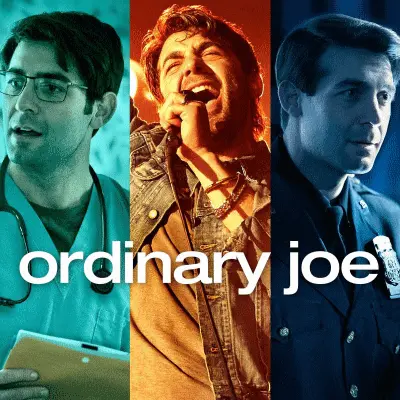NBC's Ordinary Joe works, for now, because of Josh Wolk's charisma
-

"For the terminally indecisive, NBC’s Ordinary Joe has to be either the most or the least appealing premise ever cooked up for a TV show," says Angie Han. "On the one hand, the hourlong drama posits that a single decision as seemingly inconsequential as who to grab dinner with on a given night could set the course for the rest of a person’s life. On the other, it suggests there are no real right or wrong answers — and that, in any case, the fates have a way of circling back to the same people, the same plots, the same worries about work and romance and parenthood and the same heartfelt themes about the beauty and unpredictability of life. It’s tough to tell, in the first two episodes given to critics for review, where any of this is headed in the long run. But for the time being, the series lands in the sweet spot where it’s just out-there enough to attract curiosity, and yet familiar enough to qualify as comfort viewing." Han adds that Wolk's Joe is "more Gwyneth Paltrow in Sliding Doors, not Loki in Loki. It all works well enough for now, in large part because Wolk makes for such an eminently likable lead. It’s as if the TV gods, realizing how many go-nowhere leading-man TV roles Wolk has endured, have decided to throw him three more chances at once, and he certainly makes the most of them. Wolk wears Joe’s three personas like old favorite shirts: worn in, comfortable, flattering in their imperfections. And he shares such affable chemistry with all his co-stars — especially Charlie Barnett as Joe’s childhood BFF Eric, who balances Joe’s bashful indecision with sarcastic humor and a take-charge attitude — that it becomes easy to believe all these people would be destined to stay in one another’s orbit."
ALSO:
- Ordinary Joe is a bit too high-concept for its own good: "Ordinary Joe feels, in its pilot, a bit stuck. It’s plainly attempting to capture some of the magic of This Is Us, scrambling the equation: While NBC’s signature drama hops through various real times in one family’s life, its new entrant skitters between possible experiences one person might have had, reconfiguring his family each time," says Daniel D'Addario. "A key difference, though, is that Ordinary Joe isn’t just fictional — it’s hypothetical. Ordinary Joe intends to make you feel, with a pilot touching on big, elemental emotions for its characters. And yet we know these feelings are only being evoked by a hypothetical set of circumstances — we’re celebrating, or mourning with, a story that even within the show’s world is not real. Transitions between the trio of Joes often don’t land, only emphasizing the stagy unreality of the show’s three worlds. There’s raw material here on which the show may yet improve, but in its pilot, at least, Ordinary Joe feels a bit too high-concept for its own good."
- Ordinary Joe is timeline-hopping fun: "With a lesser star, and lesser scripts, Joe would be a train wreck of convoluted storytelling and plot clichés," says Kelly Lawler. "But the ambition of Joe is admirable: It's the kind of show you want to root for, creatively and commercially, in part because Wolk is just so darn likable. Future episodes may collapse under the weight of their own timeline shenanigans, but at least in the first two made available for review, Joe feels like it could be something special."
- It’s hard to say the underlying premise of Ordinary Joe isn’t intriguing: "It is," says Kaitlin Thomas. "Everyone wonders what might have happened if they’d made a different choice, if they’d turned left instead of right, if they hadn’t left a party when they did. This idea that our lives can be changed in an instant depending on what path we choose isn’t new. Pop culture has been feasting on this very scenario for a long time, and with great success. Hell, Marvel has an entire series exploring its own 'what if?' scenarios right now. But the framing of these stories is usually limited. They have obvious endpoints. That’s not the case here, so it’s not yet obvious what the goal is, or what the lesson is supposed to be other than our lives are a series of choices. The show synopsis provided by NBC reveals that there is no 'right' choice for Joe, that his life is always messy as well as beautiful, so perhaps the goal of Ordinary Joe really is just to give us three James Wolk shows for the price of one. And even if I’m not sure I can call this show good in any traditional sense of the word, it’s kind of hard to argue against that."
- Josh Wolk has experience playing two characters on a TV show, but not three: "This was a real joy to take on," says Wolk, who starred as a character living a double life on the short-lived 2010 Fox drama Lone Star. "I've played two characters before, but I'd never played three. It's a great challenge because you really have to just switch gears.... When you're playing three characters, you have no idea what day it is."
TOPICS: Ordinary Joe, NBC, James Wolk
More Ordinary Joe on Primetimer:- Hawkeye, And Just Like That, Only Murders in the Building and Ordinary Joe earn recognition for their disability representation
- NBC cancels Ordinary Joe after one season
- TV Today: The Gilded Age Arrives on HBO, ABC Bows Wine Drama Promised Land
- TV Today: Alabama and Georgia Meet in the CFP Championship, 90 Day Fiancé Expands Yet Again
